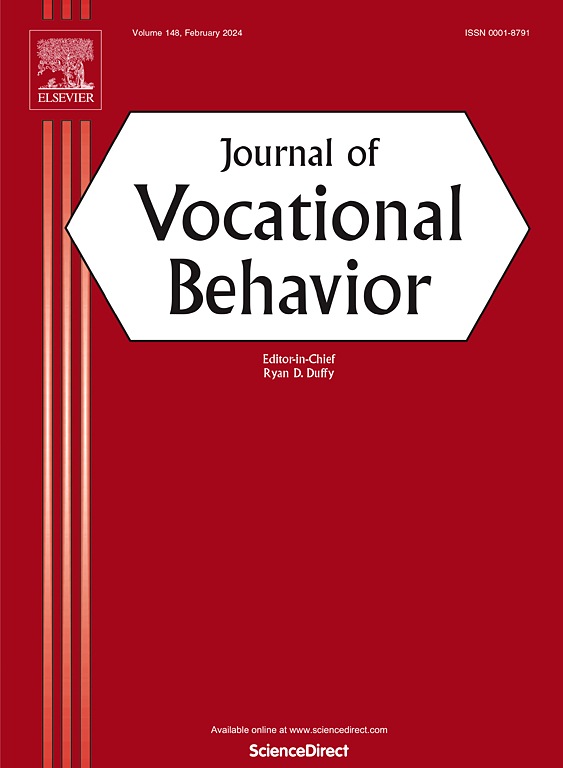Releasing pressure but increasing concerns: A daily investigation of supervisors' social sharing of stress and supervisors' well-being
IF 5.2
1区 心理学
Q1 PSYCHOLOGY, APPLIED
引用次数: 0
Abstract
The literature reveals the effectiveness of social sharing in unburdening stressed employees; however, the question of how the social sharing of stress in superior–subordinate dyads can affect supervisors' well-being remains unanswered. By integrating self-disclosure theory and conservation of resources theory, we develop a model to explore the influence of supervisors' daily social sharing of stress with their subordinates on the actors' work-related well-being, especially job satisfaction. By conducting a 10-day experience sampling study, we find that supervisors' daily social sharing of stress can promote their state of recovery from stressful working conditions and thus improve their daily job satisfaction. However, supervisors' daily social sharing of stress can trigger concerns about losing control over their subordinates, which can decrease their daily job satisfaction. Furthermore, the strength of the two effects is bounded by the supervisors' motives behind social sharing (i.e., expressive orientation and instrumental orientation), respectively. Specifically, expressive orientation can strengthen the impact of supervisors' daily social sharing of stress on their state of recovery, and instrumental orientation can weaken the influence of supervisors' daily social sharing of stress on their concerns about losing control over subordinates. We discuss the theoretical and practical implications of the findings and propose future research directions.
释压增忧:主管压力社会分担与主管幸福感的日常调查
文献揭示了社会分享在减轻压力员工负担方面的有效性;然而,上下级关系中压力的社会分担如何影响主管幸福感的问题仍未得到解答。通过整合自我表露理论和资源保护理论,我们建立了一个模型来探讨管理者与下属日常压力社会分担对行为者工作幸福感,尤其是工作满意度的影响。通过为期10天的经验抽样研究,我们发现主管日常的压力社会分享可以促进他们从压力工作状态中恢复,从而提高他们的日常工作满意度。然而,主管日常的社交压力分享可能会引发对下属失去控制的担忧,从而降低他们的日常工作满意度。此外,这两种效应的强度分别受到管理者社会分享背后动机(即表达取向和工具取向)的限制。具体而言,表达取向可以增强主管日常压力社会分担对其恢复状态的影响,工具取向可以减弱主管日常压力社会分担对其对下属失去控制的担忧的影响。我们讨论了这些发现的理论和实践意义,并提出了未来的研究方向。
本文章由计算机程序翻译,如有差异,请以英文原文为准。
求助全文
约1分钟内获得全文
求助全文
来源期刊

Journal of Vocational Behavior
PSYCHOLOGY, APPLIED-
CiteScore
13.10
自引率
5.40%
发文量
85
期刊介绍:
The Journal of Vocational Behavior publishes original empirical and theoretical articles offering unique insights into the realms of career choice, career development, and work adjustment across the lifespan. These contributions are not only valuable for academic exploration but also find applications in counseling and career development programs across diverse sectors such as colleges, universities, business, industry, government, and the military.
The primary focus of the journal centers on individual decision-making regarding work and careers, prioritizing investigations into personal career choices rather than organizational or employer-level variables. Example topics encompass a broad range, from initial career choices (e.g., choice of major, initial work or organization selection, organizational attraction) to the development of a career, work transitions, work-family management, and attitudes within the workplace (such as work commitment, multiple role management, and turnover).
 求助内容:
求助内容: 应助结果提醒方式:
应助结果提醒方式:


